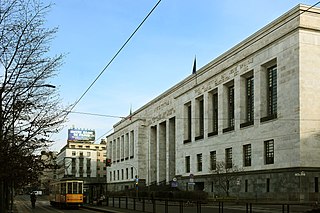Legislation
Legislation [2] includes Acts.
Acts
- Act No 277/1994 Coll [3]
- Act No 136/1995 Coll [4]
- Act No 270/1995 Coll (Language law of Slovakia)
The law of the Slovak Republic is civil law. [1]
The Constitution was passed in 1992.
The legislature is the National Council.
Legislation [2] includes Acts.
There is a Supreme Court of Slovakia and a Constitutional Court of Slovakia.
There is a Slovak Bar Association (Slovakian: Slovenská advokátska komora). [5] [6]
The Občiansky zákonník, or Slovak Civil Code, is derived from the Czechoslovak Civil Code of 1964. [9]

The Constitution of the Czech Republic is the supreme law of the Czech Republic. The current constitution was adopted by the Czech National Council on 16 December 1992. It entered into force on 1 January 1993, replacing the 1960 Constitution of Czechoslovakia and the constitutional act No. 143/1968 Col., when Czechoslovakia gave way to the Slovak Republic and the Czech Republic in a peaceful dissolution.

The Beneš decrees were a series of laws drafted by the Czechoslovak government-in-exile in the absence of the Czechoslovak parliament during the German occupation of Czechoslovakia in World War II. They were issued by President Edvard Beneš from 21 July 1940 to 27 October 1945 and retroactively ratified by the Interim National Assembly of Czechoslovakia on 6 March 1946.
Law in Denmark follows a civil law system.

The Judiciary of the Czech Republic is set out in the Constitution, which defines courts as independent institutions within the constitutional framework of checks and balances.

The judiciary of Malta interprets and applies the laws of Malta, to ensure equal justice under law, and to provide a mechanism for dispute resolution. The legal system of Malta is based partially on English law and partly on Continental law, whilst also being subject to European Union law.

The law of Sweden is a civil law system, whose essence is manifested in its dependence on statutory law. Sweden's civil law tradition, as in the rest of Europe, is founded upon Roman law as codified in the Corpus Juris Civilis, but as developed within German law, rather than upon the Napoleonic Code. But, over time Sweden along with the other Scandinavian countries have deviated significantly from their classical Roman and German models. Instead, the Scandinavian countries together with Finland, the Faroe Islands, Greenland, Åland (self-governing) and Iceland may be said to have a special "Nordic" version of jurisprudence that is neither a truly civil law system nor a part of the British-derived common law legal system.
The law of Finland is based on the civil law tradition, consisting mostly of statutory law promulgated by the Parliament of Finland. The constitution of Finland, originally approved in 1919 and rewritten in 2000, has supreme authority and sets the most important procedures for enacting and applying legislation. As in civil law systems in general, judicial decisions are not generally authoritative and there is little judge-made law. Supreme Court decisions can be cited, but they are not actually binding.

Law in Norway follows a civil law system. The Supreme Court is the highest in the nation, with 20 justices.

Czech law, often referred to as the legal order of the Czech Republic, is the system of legal rules in force in the Czech Republic, and in the international community it is a member of. Czech legal system belongs to the Germanic branch of continental legal culture. Major areas of public and private law are divided into branches, among them civil, criminal, administrative, procedural and labour law, and systematically codified.
Szladits' Bibliography on Foreign and Comparative Law is a bibliography of law. It was first compiled and edited by Charles Szladits and then edited by Vratislav Pechota. About one fifth of its entries are annotated. Pagel said it "can be helpful". Re called it "indispensable". Winterton said that it is "comprehensive" and "outstanding". Hoffman and Rumsey described it as "useful".
Information Sources in Law is a book.
The law of Albania is civil law.

The law of Italy is the system of law across the Italian Republic. The Italian legal system has a plurality of sources of production. These are arranged in a hierarchical scale, under which the rule of a lower source cannot conflict with the rule of an upper source.
The law of Luxembourg is civil law. From the Tenth Century to the Fifteenth Century the law of the Grand Duchy was customary law.

The law of Malta incorporates continental law, common law and local traditions, such as Code de Rohan. A municipal code was enacted in 1784 and replaced in 1813. Maltese law has evolved over the centuries and reflected the rule of the context of the time. At present Malta has a mixed-system codification, influenced by Roman law, French Napoleonic Code, British Common Law, European Union law, international law, and customary law established through local customs
The law of Romania is civil law.
Insolvency law of Russia mainly includes Federal Law No. 127-FZ "On Insolvency (Bankruptcy)" and Federal Law No. 40-FZ "On Insolvency (Bankruptcy) of Credit Institutions".
The law of Peru includes a constitution and legislation. The law of Perú is part of the Roman-Germanic tradition that concedes the utmost importance to the written law, therefore, statutes known as leyes are the primary source of the law.
The law of Hungary is civil law. It was first codified during the socialist period.
Anti-corruption comprises activities that oppose or inhibit corruption. Just as corruption takes many forms, anti-corruption efforts vary in scope and in strategy. A general distinction between preventive and reactive measures is sometimes drawn. In such framework, investigative authorities and their attempts to unveil corrupt practices would be considered reactive, while education on the negative impact of corruption, or firm-internal compliance programs are classified as the former.